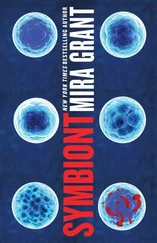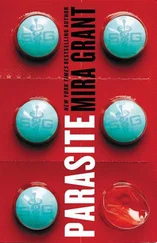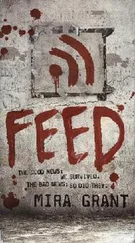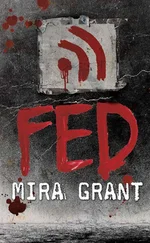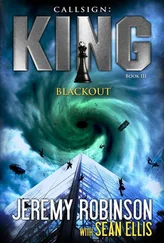“Come on, asshole. Let’s sit.” Becks took my elbow and led me to the other couch, where she pushed me into a sitting position. She sat next to me, resting her pistol on her knee.
“You don’t normally call me asshole without provocation,” I noted.
“You don’t normally act like one,” she responded.
George looked between the two of us before turning to focus on Mahir. “I’m sorry about that,” she said. “I mean, no one means to die, but… I’m so sorry.” She hesitated before asking, “How much of this was our fault, Mahir? How many people died because we wouldn’t stop telling the truth?”
Mahir’s eyes widened. I think that was the moment when he started to let himself think that maybe believing her was an option. “I don’t know,” he said. “Quite a few, I’m afraid.”
“Yeah.” She sighed, glancing at Becks and me before returning her attention to Mahir. “Rick was at the CDC a few days ago.”
“What?” Becks half stood. “You little bi—”
“Rebecca, sit down ,” snapped Mahir. It wasn’t a request.
Becks sat.
George blinked, looking bemused. “Okay, does someone want to explain that?”
“We haven’t been able to get through to Rick for a while,” I said. “We’re pretty worried, especially given everything that’s been going on. If he was at the CDC, you’re saying he knows what’s going on and he just doesn’t care. That’s sort of a big deal.”
“No.” George shook her head, expression hardening into that old, familiar look of burning journalistic fervor. She wasn’t a scared, bruised-up girl who might or might not be who she claimed to be. She was a reporter, and she had a story she needed to tell. “He’s been helping the EIS. I think he was there because he does care, and something’s been stopping him from getting to you.”
“What are you talking about?” demanded Becks.
“She was about to politely offer to wait for me to come back before she explained,” said Maggie, walking back into the room. She had a tray of drinks in her hands. It was embossed with the Agora logo, and looked like it was made of solid silver. Considering everything else around us, I would have been almost more surprised if it wasn’t.
“Sorry, Maggie,” said Becks, looking faintly abashed.
“It’s okay.” Maggie made her way around the room, starting with Mahir, who got a white ceramic mug and saucer. George got two cans of Coke, both cold enough to have drops of condensation on their sides. By the time Maggie reached me with my coffee, George already had the first of those cans open, and was taking a long, desperate drink.
Maggie leaned close as she handed me my coffee, cutting off my view of George. “If she isn’t who she says she is, she can never leave this room,” she murmured. “You understand that, don’t you, Shaun?”
I nodded minutely. “I do.”
“Good.” She straightened again, walking over to an open chair and sitting with the tray, and her own cup of tea, in her lap. “So can I get the recaplet of what happened after you left here? I doubt we have time for the whole episode.”
“We broke into the CDC through the back fence,” I said. “We got inside just fine, managed to plant the bug and everything, but then we got turned around.”
“You are in a maze of twisty little passages, all alike,” said Mahir, and laughed for no apparent reason.
“Uh, yeah. Anyway, we split up. Becks and Mahir went one way, I went the other way. And then this lady comes running around a corner and slams into me, and it’s, well…” I indicated George with my free hand. “Honestly, I didn’t think she was really there until everyone else started saying they could see her, too.”
“That’s understandable,” said Maggie, not unkindly.
“Yeah. So she says we have to get out fast, because the building is about to blow up. We get out fast. The building blows up. And then Becks starts threatening to shoot her in the head, we sort of negotiate a temporary peace, and we wind up back here, with you, having coffee.” I took the first sip of my coffee and moaned. “Really fucking good coffee. What did you do, Maggie, sacrifice a bellboy to the coffee gods?”
“Not this time,” she said, and sipped her tea before turning surprisingly sharp eyes on George. “What’s your side of the story?”
George took a breath. “Do you want the long version or the short version?”
“Let’s take the version somewhere in between. Mahir’s never going to be satisfied with the short version, and Becks will probably start shooting people if you go for the long version.”
“True,” said Becks. “To be honest, I’m tempted to start shooting people right now.”
“I missed you, too, Becks,” said George. She took another drink of Coke for courage, and said, “I woke up about a month ago—maybe a little bit more; I don’t really know, since they never let me have a calendar—in a CDC holding room. A man named Dr. Thomas said I’d been in recovery for a while, and that things were going to be better now. But my eyes were wrong, and my muscle tone was wrong, and the tattoo on the inside of my wrist was gone. I asked if I was a clone. He confirmed it.”
Becks scoffed.
To her credit, George ignored her, and continued. “One of the orderlies, Gregory Lake, was actually an EIS doctor assigned to infiltrate the facility. He’s one of the people who got me out. He told me I’d been created from a combination of electrical synapse recordings and implanted information. I’m supposed to be a ninety-seven percent match to the original Georgia Mason.” She looked toward me. “I’m not her, and I am, all at the same time.”
“So you’re not really her, and we can shoot you now, right?” asked Becks.
Mahir shook his head, frowning. “No.”
“What?” Becks gave him a wounded look. “Why not?”
“I’ve read some of the memory recovery studies. It arose from research aimed at assisting brain damage victims.” His frown deepened. “We’re nothing but electrical impulses stored in meat. If you can measure and codify those impulses, you can transcribe what a person remembers.”
But I was dead , said George. How could they measure my thoughts if I was dead?
Whether I liked it or not, it was a good question. “George was dead,” I said. “So how does that work?”
“Kellis-Amberlee keeps turning the electricity in the body and brain back on after the point of death,” said Maggie. We all turned to look at her, even George. She shrugged. “Raised by pharmaceutical magnates, remember? Kellis-Amberlee really improved our understanding of the human brain, because it won’t let the brain die. It turns back on again and again, trying to keep thinking. Only the virus starts getting in the way of those electrical impulses. It scrambles them. The body can’t translate what the brain wants anymore, and so the virus just takes over.”
“If the CDC’s built a system for recovering the electrical impulses from an infected brain, cleaning out the static and then implanting them in a new mind, it’s entirely feasible that they’d be able to accomplish what you’re claiming.” Mahir looked thoughtfully at George.
“I’m the closest match they ever made,” said George. “That’s why they decanted me. I was their show pony. I think they were planning to sell the tech that made me. Immortality for the highest bidder.”
Every eye in the room went to Maggie. She blinked, and then slowly shook her head. “No way. My parents wouldn’t do something like that, even if they could afford it.”
“Are you sure?” I asked.
“Yes. I am.” Her tone was firm, cutting off further discussion.
Читать дальше

